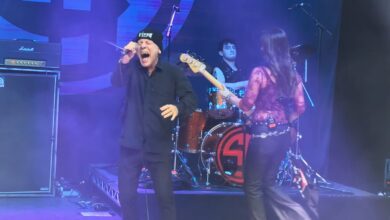Ann Wilson Delivers a Stunning Performance of “The Battle of Evermore”
Heart’s 2003 concert release captures a homecoming performance at Seattle’s Paramount Theatre, recorded on August 8, 2002, as the last night of the band’s Summer of Love Tour. Issued on both live album and DVD on June 11, 2003, the project documents a set that blends career-defining hits with a few handpicked covers, including a striking take on “The Battle of Evermore.”
The venue itself adds character. Seattle’s Paramount Theatre—originally opened in 1928 and renowned for its Beaux-Arts design—has long hosted major tours and local milestones. Its landmark status and near-3,000-seat capacity make it a dramatic backdrop, all the more fitting because Heart was performing in its hometown before a deeply engaged audience.
Within that set, “The Battle of Evermore” appears as a featured cover, explicitly credited to Led Zeppelin’s Jimmy Page and Robert Plant. Heart’s inclusion of the song on Alive in Seattle underscores the Wilson sisters’ long-running affection for Zeppelin material and their comfort bringing British folk-rock textures into a modern rock show.
Understanding the song’s origins helps explain its resonance. First released on Led Zeppelin’s untitled 1971 album commonly known as Led Zeppelin IV, “The Battle of Evermore” is a mandolin-driven folk piece notable as the band’s only studio track to feature a guest vocalist—Fairport Convention’s Sandy Denny—who duets with Robert Plant. The arrangement’s acoustic core is integral to any faithful rendering.
Heart had history with the piece long before Seattle 2002. Ann and Nancy Wilson explored this repertoire through their side project the Lovemongers, issuing a live EP titled “Battle of Evermore” in 1993. That release cemented their reputation for approaching Zeppelin with both musical respect and interpretive personality, years ahead of the Alive in Seattle performance.
The Seattle lineup that night paired the Wilsons with a veteran band: Scott Olson on guitars, Tom Kellock on keyboards, Ben Smith on drums, and Alice in Chains’ Mike Inez on bass. The show’s programming balanced signature Heart songs with covers—among them a full-throttle “Black Dog”—giving context to how “The Battle of Evermore” fit as a reflective, acoustic-leaning counterpoint.
Part of the cover’s authenticity comes from instrumentation and vocal approach. Nancy Wilson, credited with mandolin in the concert personnel, takes up the string timbre essential to the song while also providing harmonies that mirror the original’s duet structure, with Ann Wilson handling the soaring lead lines. Her public demonstrations and discussions of mandolin playing reinforce how central that instrument is to Heart’s treatment.
Production values also shaped how listeners experienced the performance. Alive in Seattle was issued as both a double-CD and a concert film, mixed for immersive playback. Contemporary reviewers praised the document as an impeccably produced snapshot of the band’s live power, making the acoustic nuances of “The Battle of Evermore” stand out amid the harder-edged numbers.
Archival listings show “The Battle of Evermore” running just under six minutes in this edition, aligning with the song’s narrative arc and giving space for mandolin figures and vocal interplay. The track’s placement among highlights like “Magic Man,” “Love Alive,” and “Barracuda” emphasizes the dynamic pacing that let Heart move fluidly between electric bombast and acoustic storytelling.
The date and tour context matter. This was the finale of the Summer of Love Tour, and the cameras captured a band leaning into its full palette—hard rock, pop hooks, and folk textures—before a hometown crowd. That framing explains why the Zeppelin material felt less like a detour and more like an integrated thread in Heart’s musical identity.
Seattle’s Paramount contributes its own sense of ceremony. As a restored movie palace turned high-traffic arts venue, it carries historic weight that complements an acoustic-anchored, British-folk-influenced song. The hall’s scale and acoustics help make a case for how “The Battle of Evermore” can remain intimate even when played in a grand room.
Audience and critic reactions to the video release regularly single out Heart’s Zeppelin interpretations. User accounts and reviews highlight “The Battle of Evermore” alongside “Black Dog” as particularly strong moments, noting how the Wilsons channel the source material without reducing it to imitation, a balance that has long defined their reputation as interpreters.
Alive in Seattle has remained available in multiple formats across years, including a 2008 Blu-ray transfer that preserved the set for high-definition viewing. That continued availability has helped new listeners discover Heart’s “Battle of Evermore,” keeping the performance in circulation well beyond its original 2003 release window.
The broader set also features diverse covers—Elton John’s “Mona Lisas and Mad Hatters” among them—positioning “The Battle of Evermore” within a night that celebrated Heart’s influences as much as its own catalog. That curation underscores the band’s knack for weaving outside material into a narrative that still feels uniquely theirs.
Taken together, Heart’s Alive in Seattle version of “The Battle of Evermore” reflects decades of engagement with Led Zeppelin’s acoustic canon, from the Lovemongers’ early-’90s readings to this polished, big-room rendering. It demonstrates how faithful instrumentation, strong duet dynamics, and careful production can translate a 1971 folk-rock duet into a modern concert centerpiece without losing its original character.





